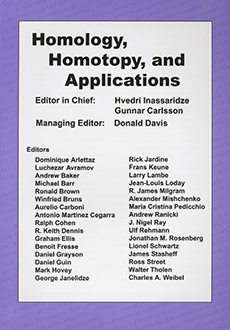Abstract
Let $G$ be a finite group and $k$ be a field of characteristic $p > 0$. A cohomology class $\zeta\in H^n (G,k)$ is called productive if it annihilates $\rm{Ext}^*_{kG}(L_\zeta,L_\zeta)$. We consider the chain complex $\mathbf{P}(\zeta)$ of projective $kG$-modules which has the homology of an $(n - 1)$-sphere and whose $k$-invariant is $\zeta$ under a certain polarization. We show that $\zeta$ is productive if and only if there is a chain map $\Delta : \mathbf{P}(\zeta)\to \mathbf{P}(\zeta)\otimes \mathbf{P}(\zeta)$ such that $(\rm{id} \otimes \epsilon) \Delta \simeq \rm{id}$ and $(\epsilon \otimes \rm{id}) \Delta \simeq \rm{id}$. Using the Postnikov decomposition of $\mathbf{P}(\zeta) \otimes \mathbf{P}(\zeta)$, we prove that there is a unique obstruction for constructing a chain map $\Delta$ satisfying these properties. Studying this obstruction more closely, we obtain theorems of Carlson and Langer on productive elements.
Citation
Ergün Yalçin. "Productive elements in group cohomology." Homology Homotopy Appl. 13 (1) 381 - 401, 2011.
Information





